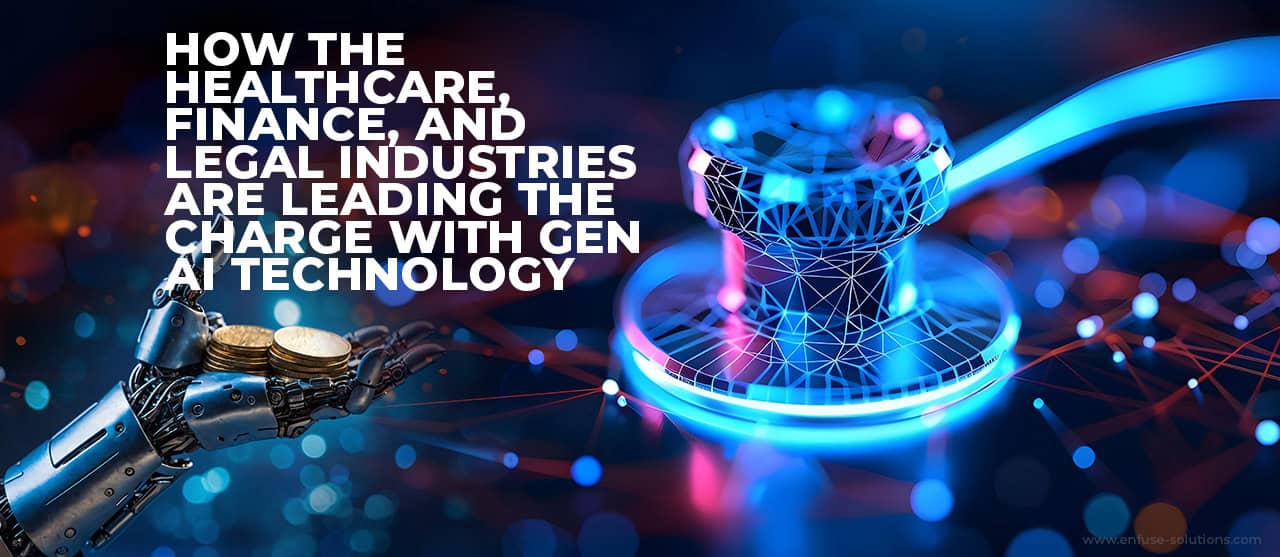
In recent years, generative artificial intelligence (Gen AI) has rapidly evolved from a niche technology into a game-changer across various sectors. Industries such as healthcare, finance, and legal have witnessed significant transformations, with Gen AI leading the charge toward automation, improved efficiency, and enhanced decision-making.
In this blog, we explore how these industries are utilizing Gen AI, backed by the latest statistics, reports, and trends.
What Is Generative AI?
Generative AI refers to machine learning models capable of generating new content, including text, images, audio, and more, based on existing data. These models use enormous volumes of data to generate results that resemble the intellect and creativity of humans. The most well-known example of Gen AI is OpenAI’s GPT (Generative Pre-trained Transformer), which powers applications like chatbots, content generation, and even decision support systems.
The Rise Of Gen AI: Key Statistics And Trends
The global AI market is projected to grow exponentially in the coming years. As per a report from Grand View Research, the global artificial intelligence market is projected to reach $1,811.75 billion by 2030, with an anticipated compound annual growth rate (CAGR) of 36.6% from 2024 through 2030. Another report by McKinsey & Company shows that AI adoption has surged in the past six years, with 72% of businesses reporting AI usage in at least one function in 2024.
Among the most prominent sectors driving AI adoption are healthcare, finance, and legal services. These industries are embracing Gen AI to streamline operations, enhance customer experience, and make data-driven decisions.
Gen AI In Healthcare: Revolutionizing Patient Care
1. Personalized Treatment Plans
The healthcare sector is seeing a profound transformation with the integration of Gen AI, particularly in creating personalized treatment plans. AI algorithms can analyze patient data, medical histories, and genetic profiles to recommend tailored treatment protocols. According to Accenture, AI applications in healthcare could potentially save $150 billion annually for the U.S. healthcare industry by 2026.
2. Drug Discovery And Development
Drug discovery procedures are being expedited by Gen AI, which is reducing the time it takes to introduce new medications to the market. AI models like AlphaFold are being used to predict protein structures, which plays a crucial role in understanding diseases and developing new treatments. A report by Deloitte highlights that AI could reduce the drug discovery process from 10–15 years to just 5–7 years, thus saving billions in R&D costs.
3. AI-Powered Diagnostics
AI-powered tools are enhancing diagnostic accuracy. Gen AI models can analyze medical images, such as X-rays and MRIs, with remarkable precision, often detecting conditions earlier than traditional methods. A study analyzing approximately 1.2 million mammograms found that combining a radiologist with an AI system improved breast cancer detection rates by 2.6% compared to the radiologist working independently. These findings were published in The Lancet Digital Health in July 2022.
4. Virtual Health Assistants
Virtual assistant usage in the medical field is growing. These AI-powered assistants can answer patient queries, schedule appointments, and even monitor health metrics. Grand View Research forecasts that the healthcare chatbot industry will develop at a compound annual growth rate (CAGR) of 23.9% between 2023 and 2030, with a valuation of $787.1 million in 2022.
Gen AI In Finance: Encouraging Fintech And Investment Innovation
1. Fraud Detection And Risk Management
In the finance sector, Gen AI is crucial in fraud detection and risk management. AI models analyze transaction data in real-time to identify fraudulent activities. According to a Juniper Research analysis, financial institutions that implement AI solutions for fraud detection and prevention could save more than $10 billion by 2027.
2. Algorithmic Trading
Algorithmic trading, driven by AI, has become a dominant force in financial markets. AI algorithms can analyze large volumes of data and make split-second trading decisions. Medium reports that average monthly returns from AI-driven hedge funds were roughly 0.75%, whereas monthly returns from human-guided hedge funds were roughly 0.25%.
3. Personalized Financial Services
Gen AI is transforming the customer experience in banking through personalized services. From AI-powered chatbots to robo-advisors, financial institutions are leveraging AI to offer tailored advice and product recommendations. A Salesforce report indicates that 69% of customers prefer AI-driven financial services for personalized insights, as they find them more reliable and responsive.
4. Risk Modeling And Prediction
Incorporating AI in risk modeling allows financial institutions to predict market trends and assess risks with greater accuracy. AI-driven models are increasingly being used to forecast economic conditions, helping businesses make informed investment decisions. A report by NVIDIA predicts that 91% of financial institutions are either evaluating AI or already integrating it into their operations for risk management.
Gen AI In Legal: Automating Document Review And Enhancing Decision-Making
1. Automated Contract Review
Gen AI is being used by law firms to automate laborious processes like contract review. AI-powered platforms can analyze complex legal documents, extract relevant information, and flag potential risks. According to Thomson Reuters, AI-driven contract analysis tools can free up 12 hours of work time per week within five years — and four hours within the next year, significantly improving efficiency.
2. Predictive Legal Analytics
Another use of Gen AI is predictive legal analytics, which employs AI models to analyze past case outcomes and project the outcome of future litigation. This is particularly useful for legal professionals looking to assess the viability of litigation. A group that examined the European Court of Human Rights case text using machine learning claimed to have predicted the conclusion with 79% accuracy.
3. AI-Assisted Legal Research
AI-powered legal research platforms are making it easier for attorneys to find relevant case laws and precedents. These platforms use natural language processing (NLP) to understand and process legal queries, delivering more accurate search results. LexisNexis reports that AI-assisted research tools can cut down research time, allowing legal professionals to focus on higher-value tasks.
4. Legal Chatbots And Virtual Assistants
Similar to healthcare, the legal industry is also leveraging virtual assistants to enhance client interactions. AI chatbots can help with a variety of functions, like making appointment appointments, responding to frequently asked questions, and giving basic legal advice. According to the ninth edition of the Legal Trends Report, the percentage of legal practitioners using artificial intelligence has increased dramatically from 19% in 2023 to 79% this year.
The Road Ahead: Challenges And Opportunities
While Gen AI offers tremendous potential, its widespread adoption does come with challenges. Data privacy, moral AI applications, and job displacement are issues that need to be addressed. Policies and regulatory frameworks will be essential in guaranteeing the ethical application of AI in various sectors.
However, the opportunities far outweigh the challenges. The continued integration of Gen AI in healthcare, finance, and legal services will drive innovation, improve operational efficiency, and enhance decision-making capabilities. According to a new forecast from Forrester, generative AI is predicted to increase at an average annual rate of 36% in 2030, making up 55% of the AI software market.
Role Of EnFuse Solutions
- EnFuse Solutions leverages Generative AI to automate processes and enhance decision-making across healthcare, finance, and legal sectors.
- From optimizing patient care to detecting fraud and streamlining legal document reviews, EnFuse Solutions delivers tailored AI-driven solutions that boost efficiency and innovation.
- By integrating Gen AI with industry expertise, EnFuse Solutions helps businesses cut costs, improve accuracy, and stay competitive with data-driven insight.
Conclusion
Generative AI is not just a futuristic concept but a technology that is already reshaping industries like healthcare, finance, and legal. From improving patient outcomes to automating financial transactions and revolutionizing legal research, Gen AI is at the forefront of digital transformation.
As these industries continue to innovate, Gen AI will undoubtedly play a pivotal role in shaping the future, offering businesses and consumers alike a more efficient and data-driven world. Embracing Gen AI today means being prepared for the advancements of tomorrow. The healthcare, finance, and legal industries are not just keeping up—they are leading the charge.






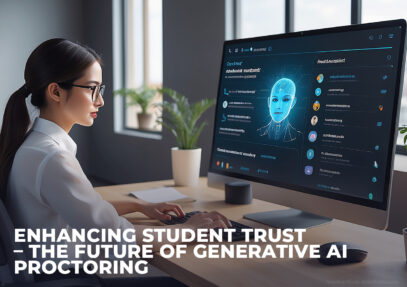
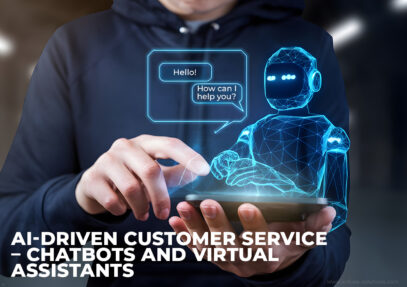
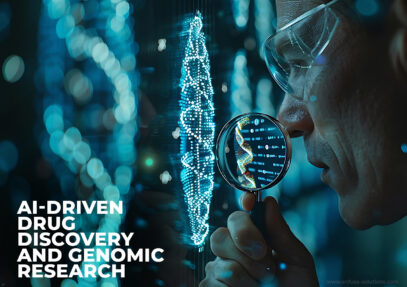




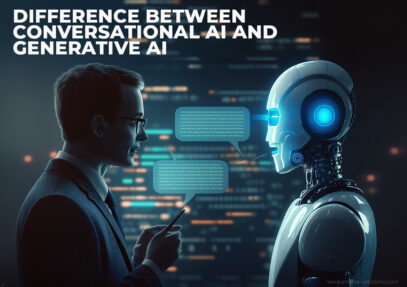

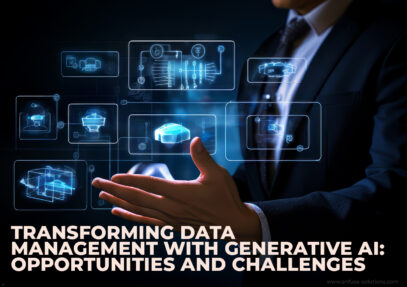

Comment